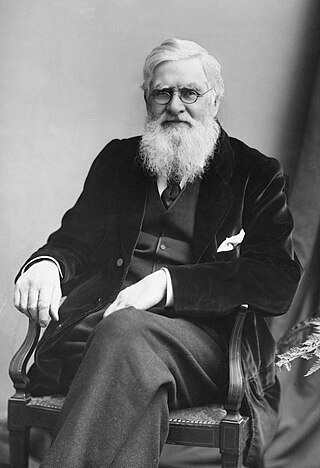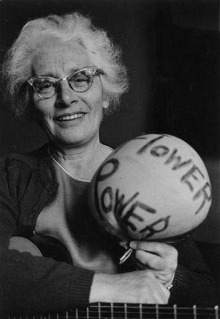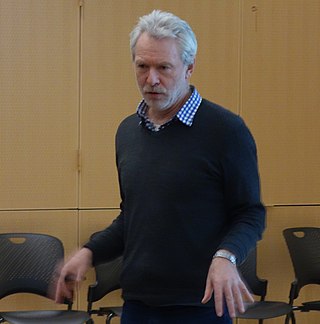Related Research Articles

Alfred Russel Wallace was an English naturalist, explorer, geographer, anthropologist, biologist and illustrator. He independently conceived the theory of evolution through natural selection; his 1858 paper on the subject was published that year alongside extracts from Charles Darwin's earlier writings on the topic. It spurred Darwin to set aside the "big species book" he was drafting and to quickly write an abstract of it, which was published in 1859 as On the Origin of Species.

Beowulf is an Old English epic poem in the tradition of Germanic heroic legend consisting of 3,182 alliterative lines. It is one of the most important and most often translated works of Old English literature. The date of composition is a matter of contention among scholars; the only certain dating is for the manuscript, which was produced between 975 and 1025 AD. Scholars call the anonymous author the "Beowulf poet". The story is set in pagan Scandinavia in the 5th and 6th centuries. Beowulf, a hero of the Geats, comes to the aid of Hrothgar, the king of the Danes, whose mead hall Heorot has been under attack by the monster Grendel for twelve years. After Beowulf slays him, Grendel's mother takes revenge and is in turn defeated. Victorious, Beowulf goes home to Geatland and becomes king of the Geats. Fifty years later, Beowulf defeats a dragon, but is mortally wounded in the battle. After his death, his attendants cremate his body and erect a barrow on a headland in his memory.

Harold Witter Bynner, also known by the pen name Emanuel Morgan, was an American poet and translator. He was known for his long residence in Santa Fe, New Mexico, and association with other literary figures there.

Malvina Reynolds was an American folk/blues singer-songwriter and political activist, best known for her songwriting, particularly the songs "Little Boxes", "What Have They Done to the Rain" and "Morningtown Ride".

"Little Boxes" is a song written and composed by Malvina Reynolds in 1962. The song was first released by her friend, Pete Seeger, in 1963, and became his only charting single in January 1964.
Nationality words link to articles with information on the nation's poetry or literature.

The Journal of Natural History is a scientific journal published by Taylor & Francis focusing on entomology and zoology. The journal was established in 1841 under the name Annals and Magazine of Natural History and obtained its current title in 1967. The journal was formed by the merger of Loudon and Charlesworth's Magazine of Natural History (1828–1840) and the Annals of Natural History.
Nationality words link to articles with information on the nation's poetry or literature.
Nationality words link to articles with information on the nation's poetry or literature.
Nationality words link to articles with information on the nation's poetry or literature.
Nationality words link to articles with information on the nation's poetry or literature.
Nationality words link to articles with information on the nation's poetry or literature.

The Darwin–Wallace Medal is a medal awarded by the Linnean Society of London for "major advances in evolutionary biology". Historically, the medals have been awarded every 50 years, beginning in 1908. That year marked 50 years after the joint presentation by Charles Darwin and Alfred Russel Wallace of two scientific papers—On the Tendency of Species to form Varieties; and on the Perpetuation of Varieties and Species by Natural Means of Selection—to the Linnean Society of London on 1 July 1858. Fittingly, Wallace was one of the first recipients of the medal, in his case it was, exceptionally, in gold, rather than the silver version presented in the six other initial awards. However, in 2008 the Linnean Society announced that due to the continuing importance of evolutionary research, the medal will be awarded on an annual basis beginning in 2010.

Arnold Charles Brackman was an American journalist and author.

Andrew Berry is a British evolutionary biologist and historian of science with a particular interest in Alfred Russel Wallace. Previously, he was a Junior Fellow at the Harvard Society of Fellows and he is currently a lecturer in Organismic and Evolutionary Biology at Harvard University.

William Carpenter was an English printer and author, and a proponent of the flat Earth hypothesis, active in England and the United States in the nineteenth century. Carpenter immigrated to the United States and continued his advocacy of the Flat Earth movement.
Jim Wayne Miller was an American poet and educator who had a major influence on literature in the Appalachian region.
John Langdon Brooks (1920-2000) was an American evolutionary biologist, ecologist and limnologist.
Eliza Fanny Staveley (1831–1903), published as E.F. Staveley, was a British entomologist, arachnologist, and author. Her work British Insects (1871) was favourably reviewed by Alfred Russel Wallace in Nature.
Terri Lynn Jewell was an American author, poet and Black lesbian activist. She was the editor of The Black Woman’s Gumbo Ya-Ya, which received the New York City Library Young Persons Reading Award in 1994.